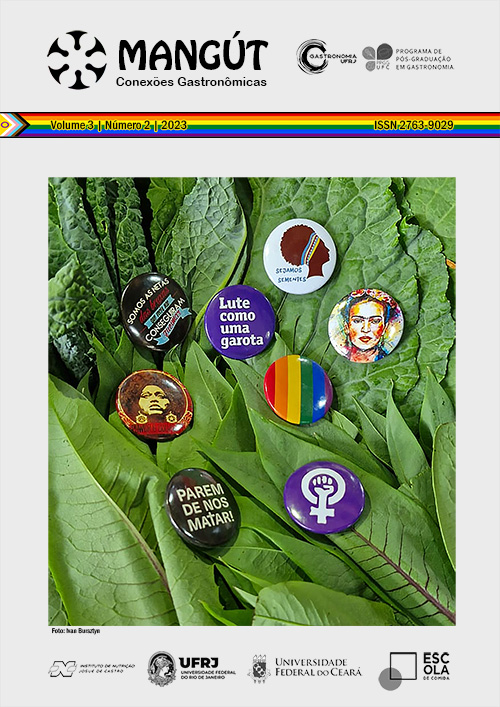Knowlwdge, flavors and (in)justice: black female writings about the senses that fill the flavors
DOI:
https://doi.org/10.70051/mangt.v3i2.61163Keywords:
Gastronomy, Knowledge-taste, Feminine, HungerAbstract
This theoretical essay is a provocation about the meanings that fill words and the words that name the meanings. If knowledge is etymologically flavor, we ask about the meanings of these flavors. Since the experiences of flavors are related to embodied experiences, we emphasize the Escrevivências of women who use art/literature to denounce their cosmoperceptions, which we celebrate as a mirror of invisible realities in Brazilian dynamics. We inscribe coloniality as a framework that endures and accentuates differences, and we dare to demarcate possible reexistences. Our objective is to revisit rigid formats and propose new paths for the development of research in the field of Gastronomy that looks at multiple meanings and poetics of words. We move between different perspectives, from Brillat-Savarin to Rubens Alves, proposing ways to revisit hegemonic eurocentric logics and to build new languages and perspectives that contemplate intellectuals against hegemons and also calling on female authors of literature. Finally, we pay attention to hunger as an urgency that belongs to the field of Gastronomy and remains in the shadows in research and writings.
Downloads
Published
Issue
Section
License
Copyright (c) 2024 Lourence Cristine Alves, Isis Pereira Coutinho-Degani, Leticia Maria Lima Silva

This work is licensed under a Creative Commons Attribution 4.0 International License.
Autores que publicam nesta revista concordam com os seguintes termos:
- Autores mantém os direitos autorais e concedem à revista o direito de primeira publicação, com o trabalho simultaneamente licenciado sob a Licença Creative Commons Attribution que permite o compartilhamento do trabalho com reconhecimento da autoria e publicação inicial nesta revista.
- Autores têm autorização para assumir contratos adicionais separadamente, para distribuição não-exclusiva da versão do trabalho publicada nesta revista (ex.: publicar em repositório institucional ou como capítulo de livro), com reconhecimento de autoria e publicação inicial nesta revista.
- Autores têm permissão e são estimulados a publicar e distribuir seu trabalho online (ex.: em repositórios institucionais ou na sua página pessoal) a qualquer ponto antes ou durante o processo editorial, já que isso pode gerar alterações produtivas, bem como aumentar o impacto e a citação do trabalho publicado (Veja O Efeito do Acesso Livre).



